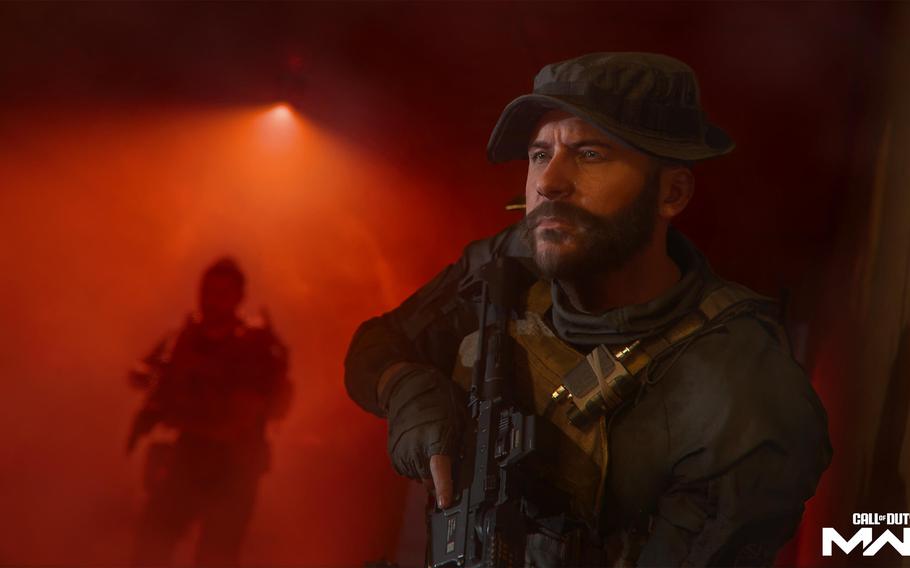
According to David Swenson, Call of Duty: Modern Warfare III’s creative director, “Now we’re really leaning into our ability to have the engine adapt to the play style of the player. If you’re going to be totally quiet or go in guns blazing, the campaign will totally adapt and support however you want to play it.” (Sledgehammer Games)
In a production meeting for the upcoming Call of Duty: Modern Warfare III, David Swenson heard a colleague describe how they played their favorite mission about 20 times.
"At the end of the meeting, we said, 'Hey, what did you think of the cave?'" Swenson, the video game's creative director, said in an interview. "And he was like, 'What cave?'"
This never happens in a Call of Duty story mode. The series has been known for linear, cinematic stories: Every player experiences every mission the same way, enters buildings through the same door, and performs military feats like rescuing hostages with the same methods and the same weapons. But 2023's Call of Duty entry, scheduled for release on Nov. 10, aims to finally break the mold.
Modern Warfare III, developed by Sledgehammer Games, will feature what the team has dubbed "open combat missions," which use open-ended spaces to present different and optional objectives. Players could revisit a location several times without seeing a particular story beat. If players want to be silent, they can use silent weapons. If they want to breach and clear a room, players can choose which tools and weapons to use and where to enter. It is the first time the multibillion-dollar franchise, the biggest in the games industry, will offer a "sandbox" experience.
When it comes to revenue, the Call of Duty franchise is a titan in entertainment. Every year, publisher Activision Blizzard releases a new title that usually tops the annual sales charts. Last year's Modern Warfare 2 earned $1 billion in 10 days.
The series has earned this success through its multiplayer features, but its single-player story mode is also known for "cinematic roller coaster rides," Swenson said. "Now we're really leaning into our ability to have the engine adapt to the play style of the player. If you're going to be totally quiet or go in guns blazing, the campaign will totally adapt and support however you want to play it."
The series has flirted briefly with more open-ended play in the past, using dialogue choices and featuring slightly larger battlefields. But Modern Warfare III is the first entry that makes the sandbox a priority - a new approach for Brian Bloom, the narrative director for the Call of Duty franchise and a veteran actor who also has experience writing for film. For years, his Call of Duty scripts have been fairly linear, since the series often echoes Hollywood blockbuster action movies. The screenplay for Modern Warfare III is different.
"If you could picture a screenplay page where action would ordinarily be written, the typical version would be 'See X as we approach X, and X are moving toward X,'" Bloom said. "Now, I had at the very beginning in a bracket for every action that says, 'if/when.' That's an exciting development for us."
Bloom said the game includes branching dialogue trees that vary and react to player decisions, or even indecision. Discovering new areas in the game will trigger speech that you may miss the first time around. Sometimes, character lines will vary depending on whether the player is standing still, in a firefight or performing any kind of action. Bloom said the cast recorded lines in loud and soft tones, depending on how the player approaches situations.
"They're not just saying the same lines quietly or with a projected voice. There are things that would sound better in stealth, maybe would be more curt," Bloom said.
Released in 2007, the original Call of Duty: Modern Warfare was a milestone for first-person shooters, as it established many multiplayer mechanics still used in many online games today. It had a self-contained story that ended with Modern Warfare 3 in 2011, the first Call of Duty game Swenson worked on.
In 2019, the franchise rebooted the Modern Warfare brand, keeping its most popular characters, such as British Special Air Service Capt. John Price, alongside new team members and a new story. This year's game picks up after a narrative cliffhanger from Modern Warfare II.
The series is also establishing history and lore of its fake countries like Urzikstan, a reimagination of nations like Syria, and Kastovia, a vaguely Eastern European nation with stories dating back to the series's version of World War II, once occupied by the game's version of Nazi Germany. The modern ongoing Call of Duty series revisits these places in its single-player and multiplayer components. Swenson and Bloom agree that the characters and settings of the narrative are the "soul" of the series. It's why mentioning the fictional city Verdansk to any Call of Duty player today will conjure memories of their own time in that setting.
"People have become attached to places within these cities, and that gives us an opportunity to treat those places as characters," Bloom said. "So players can find an area and realize now this place has a backstory, you're going to see what it was like in the past. They've had experiences there."
The original Modern Warfare trilogy of the early aughts ended with the third game. But Bloom said the story of the rebooted trilogy will extend beyond this year's release, with character arcs planned for long-term stories told in future games that build off the new established storylines.
"We think of character arcs as going one way, but they can also fall off their arc, they can go backwards, people can evolve and devolve," Bloom said. "All these things, they offer rich, fertile ground to tell stories, and that's not going to stop. In fact, I would say we're just getting started."